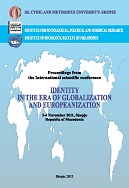INTERCULTURAL COMPETENCE AND IDENTITY NEGOTIATION
INTERCULTURAL COMPETENCE AND IDENTITY NEGOTIATION
Author(s): Ivan BlazhevskiSubject(s): Social Sciences
Published by: Институт за социолошки и политичко-правни истражувања
Keywords: culture; identity; intercultural dialogue; intercultural competence
Summary/Abstract: Globalization processes are giving rise to more systematic cultural encounters, borrowings and exchanges. Crossing borders and being in contact with languages, customs and beliefs different than ours, questions the truths we have always taken for granted, and this triggers insecurity and uneasiness. So, the question of identities – national, cultural, religious, ethnic, linguistic, gender-based – is assuming renewed importance for individuals and groups who see globalization and cultural change as a threat to their beliefs and ways of life. The development of human culture is made possible through communication. Intercultural dialogue promotes the sharing of ideas and explores different ways of looking at the world. Rethinking our cultural categories, recognizing the multiple sources of our identities, helps to shift the focus away from ‘differences’ towards our shared ability to evolve through interaction. One of the major factors influencing the effectiveness in communicating with people from other cultures is the ability to understand their culture. This explains why intercultural dialogue is largely dependant on intercultural competencies, defined as the complex of abilities needed to interact appropriately with those who are different from oneself.
Journal: Proceedings from the International scientific conference
- Issue Year: 2012
- Issue No: 1
- Page Range: 441-449
- Page Count: 9
- Language: English
- Content File-PDF

